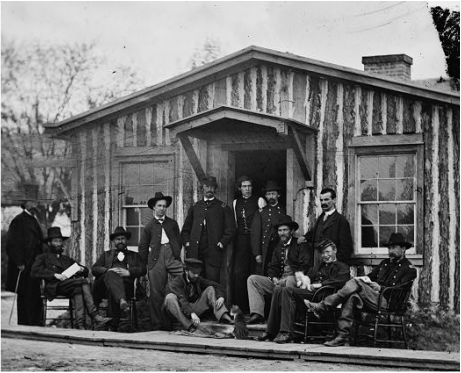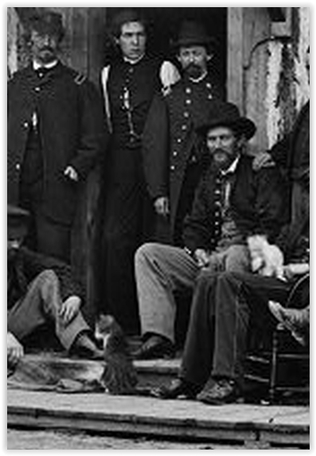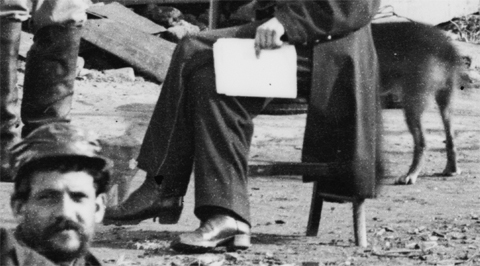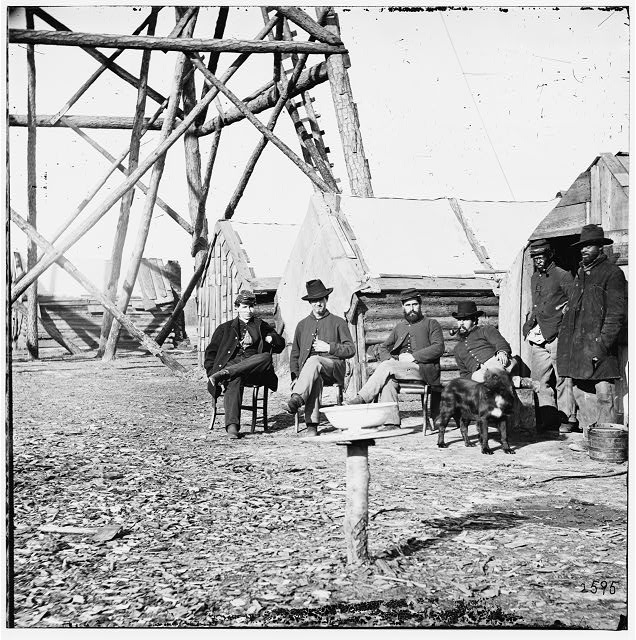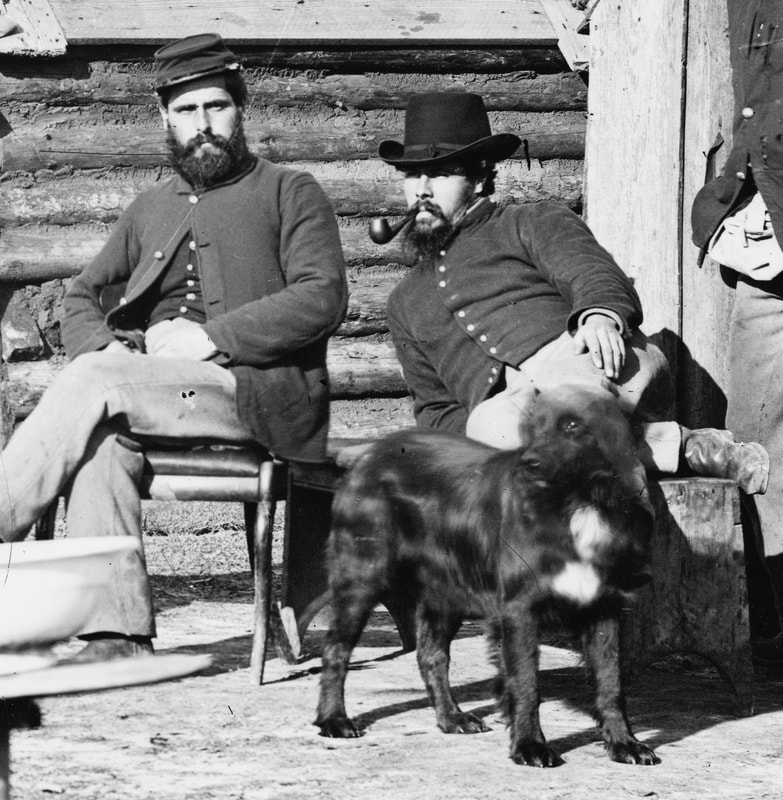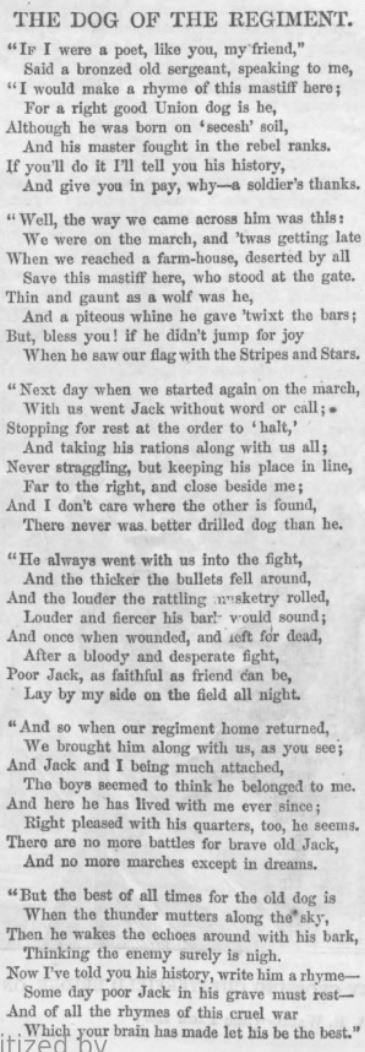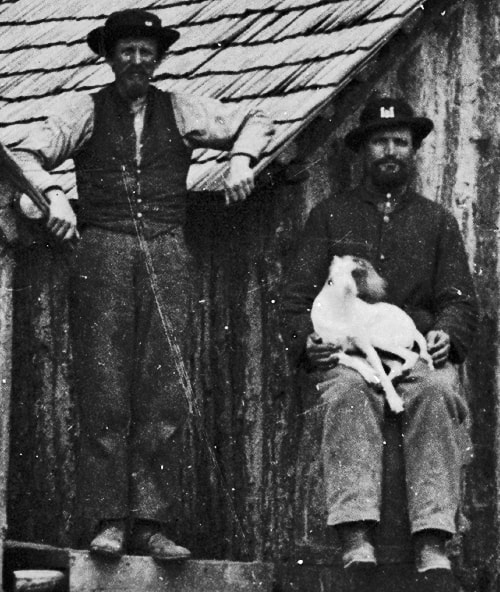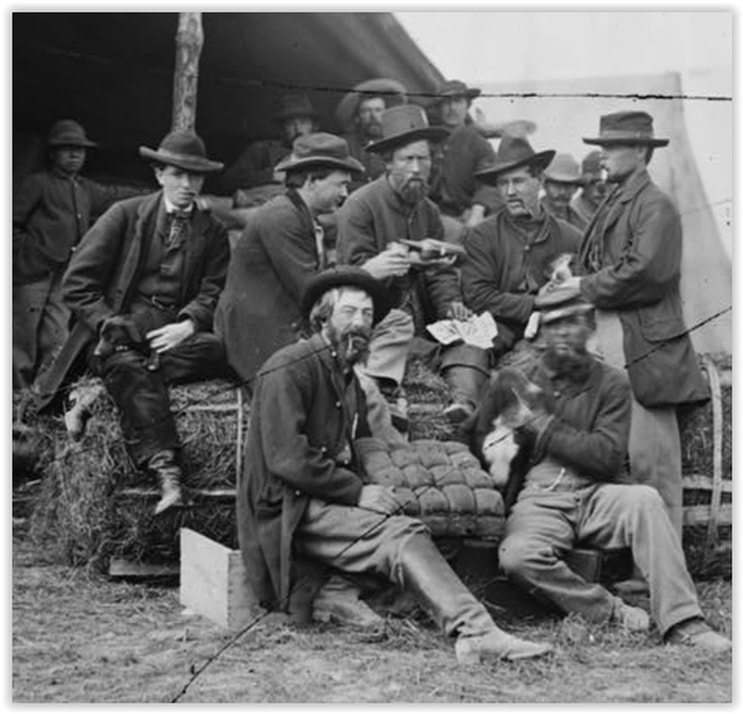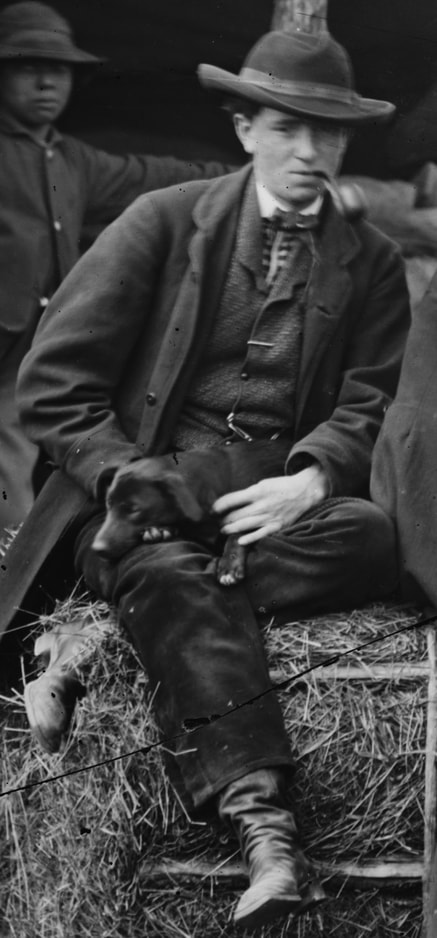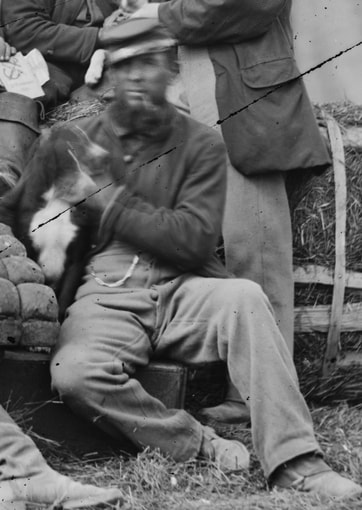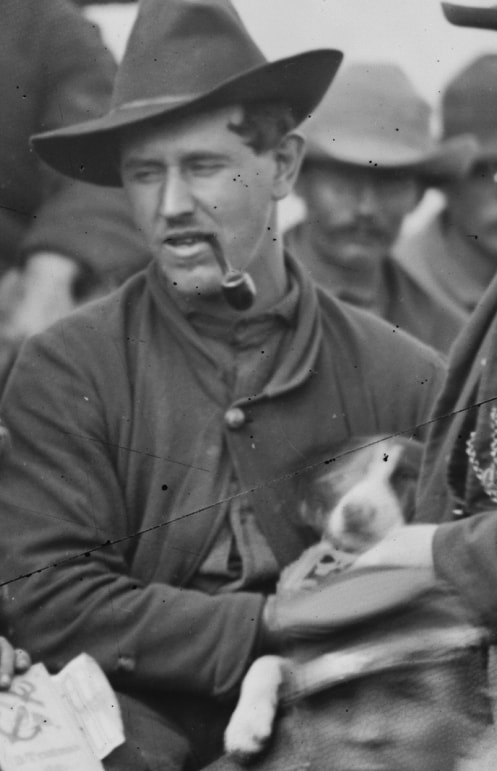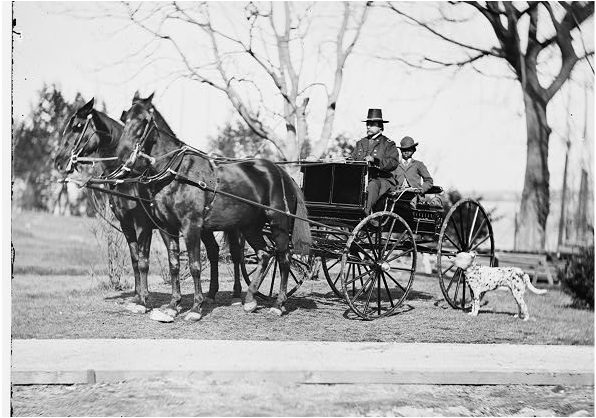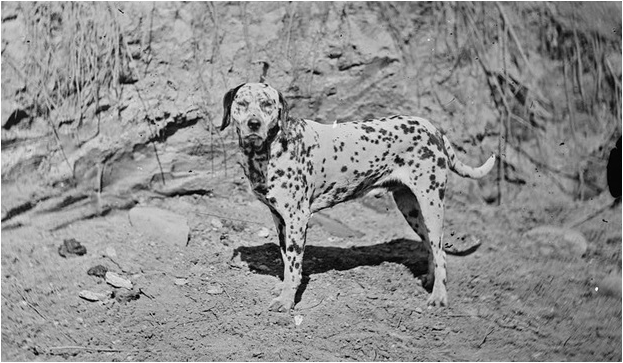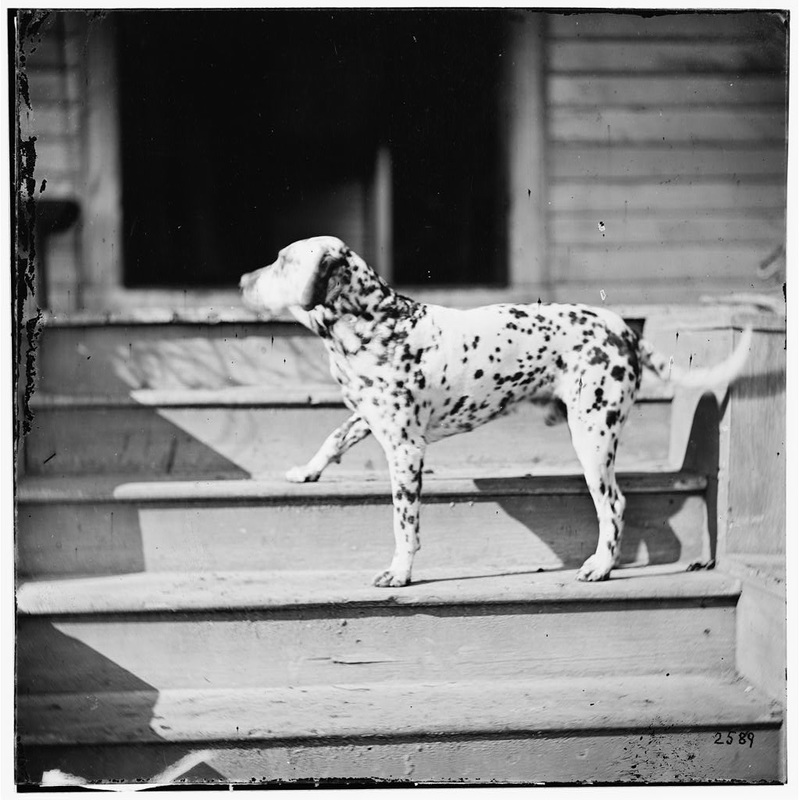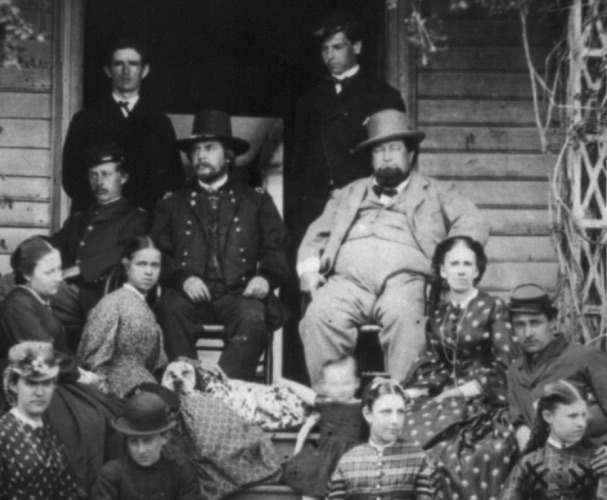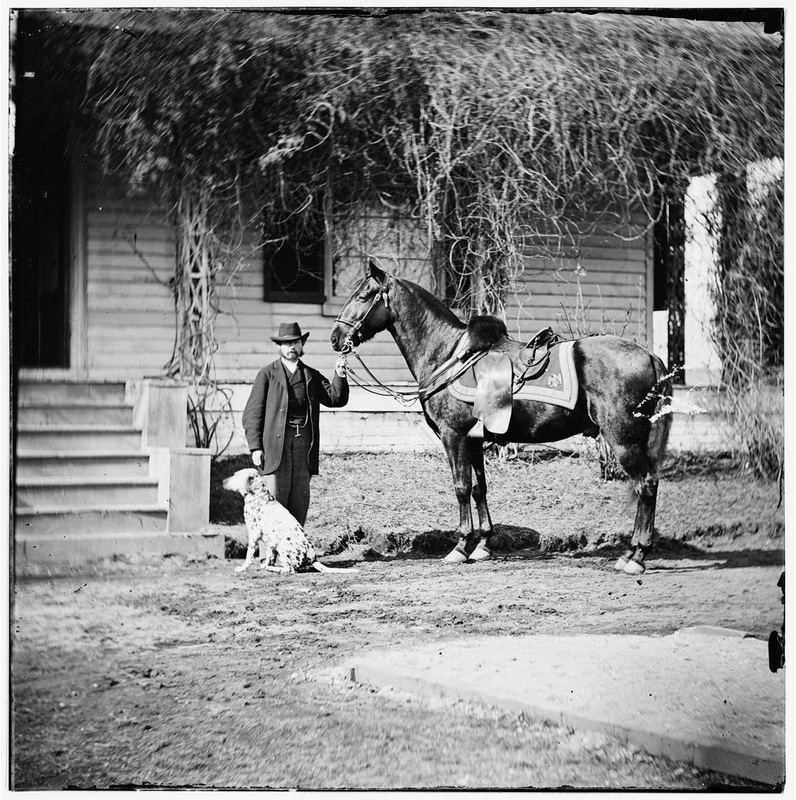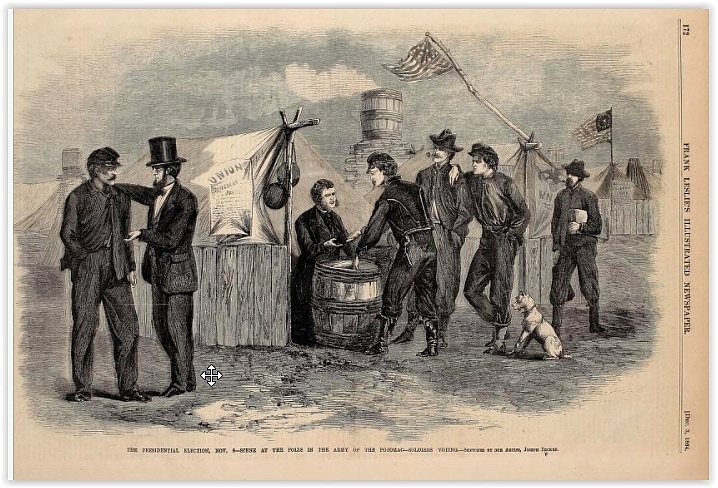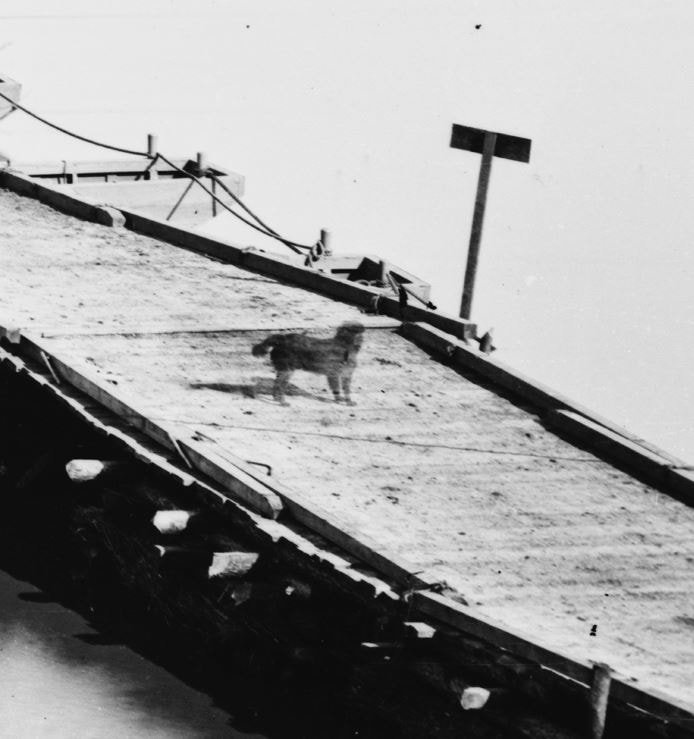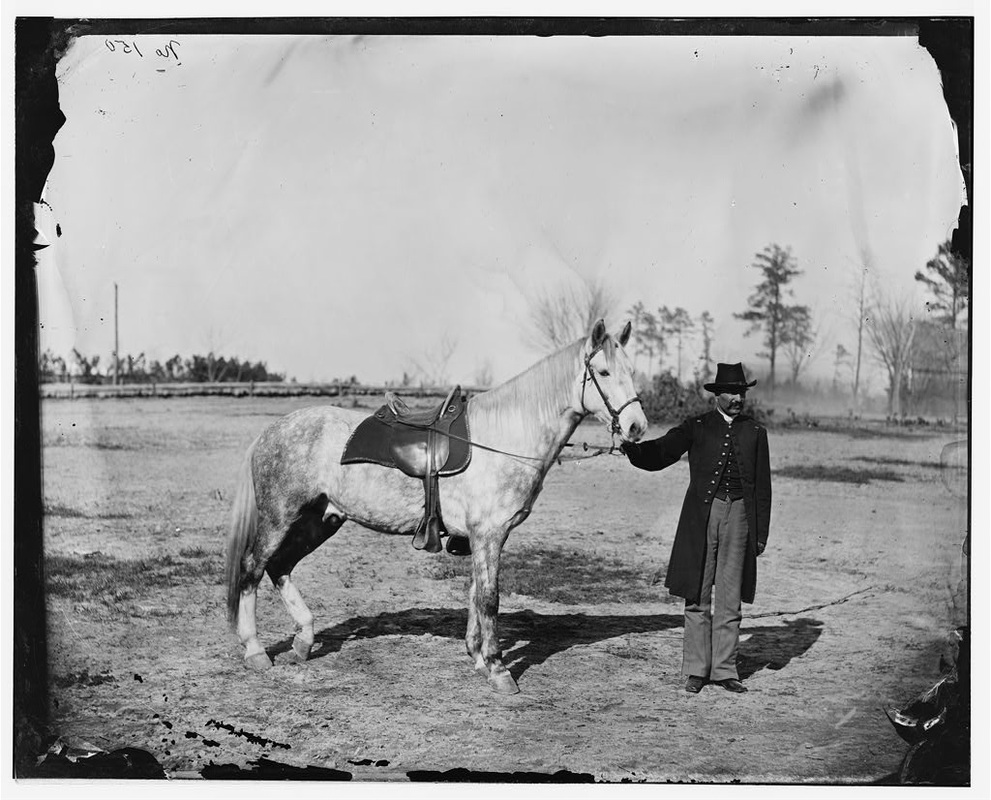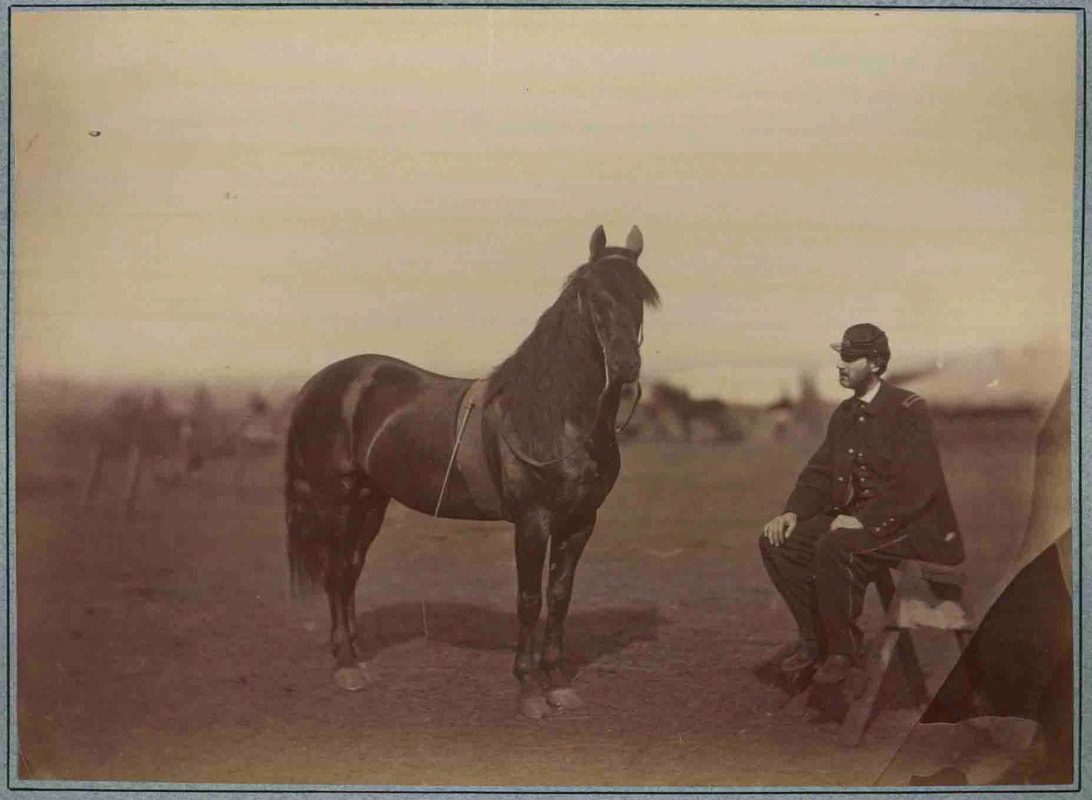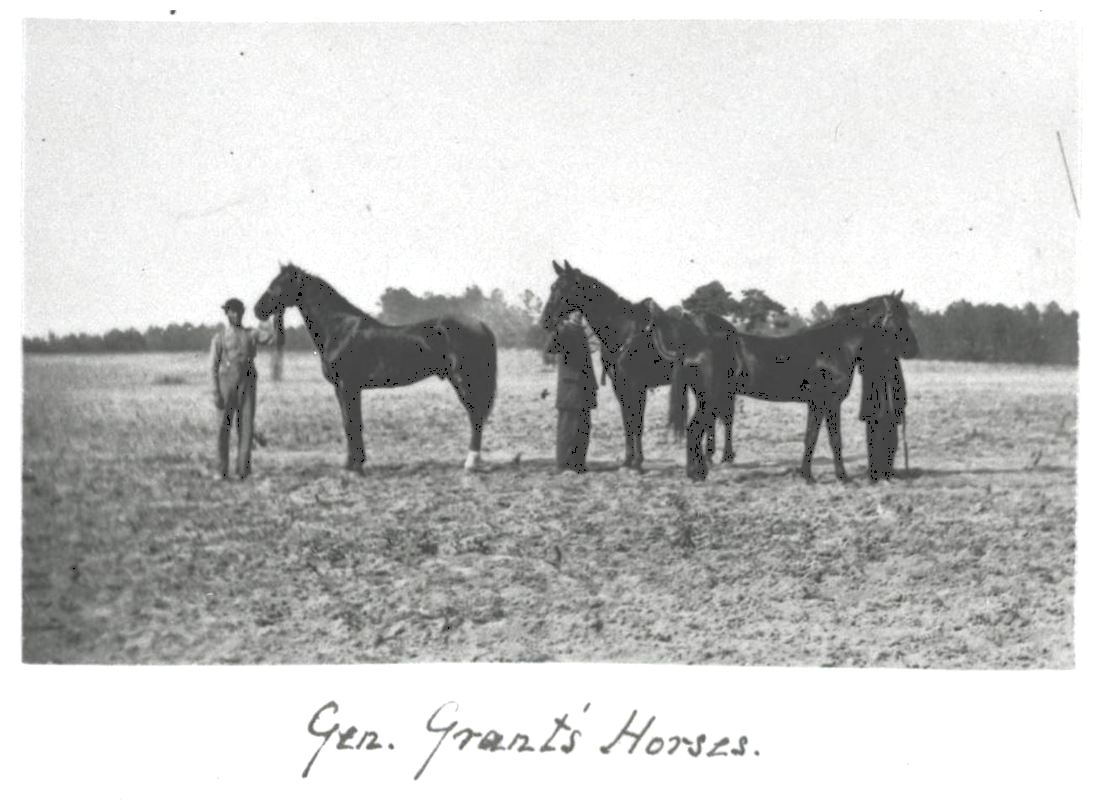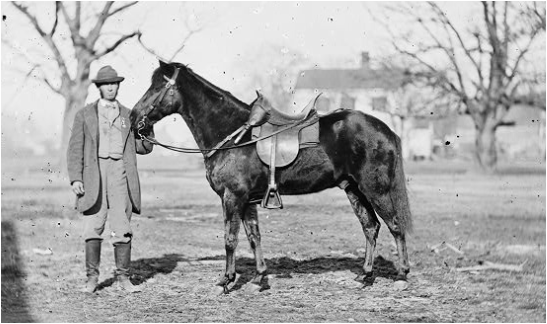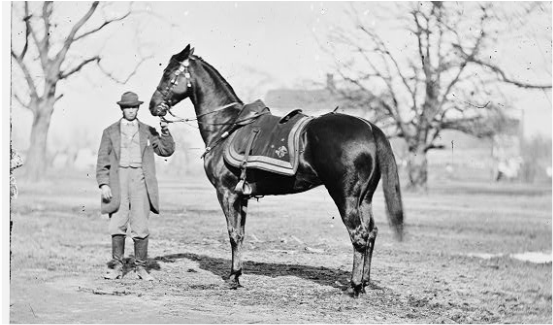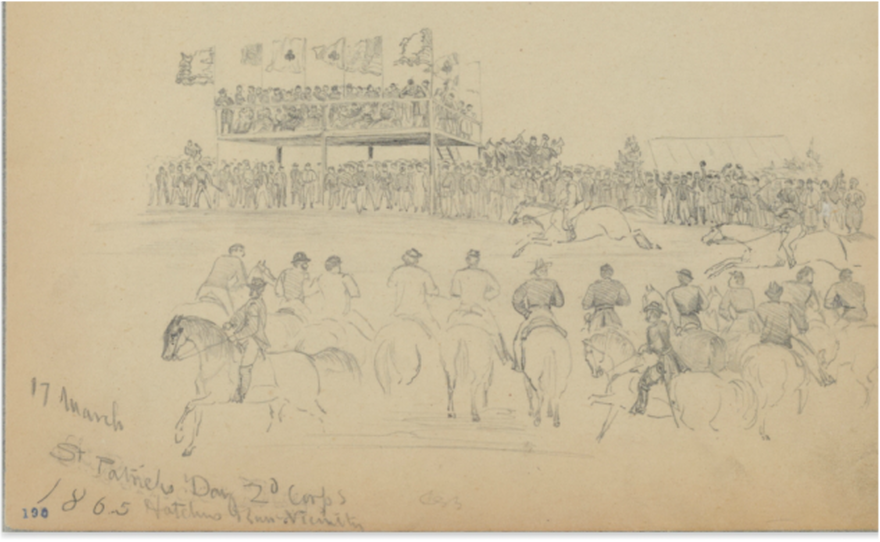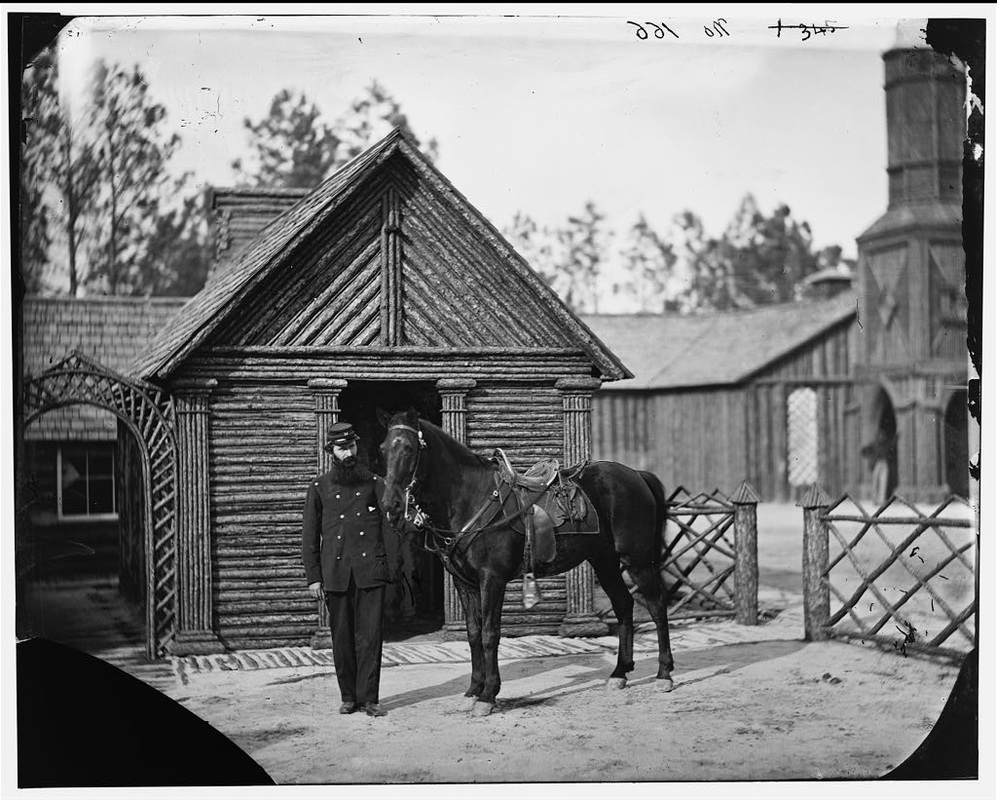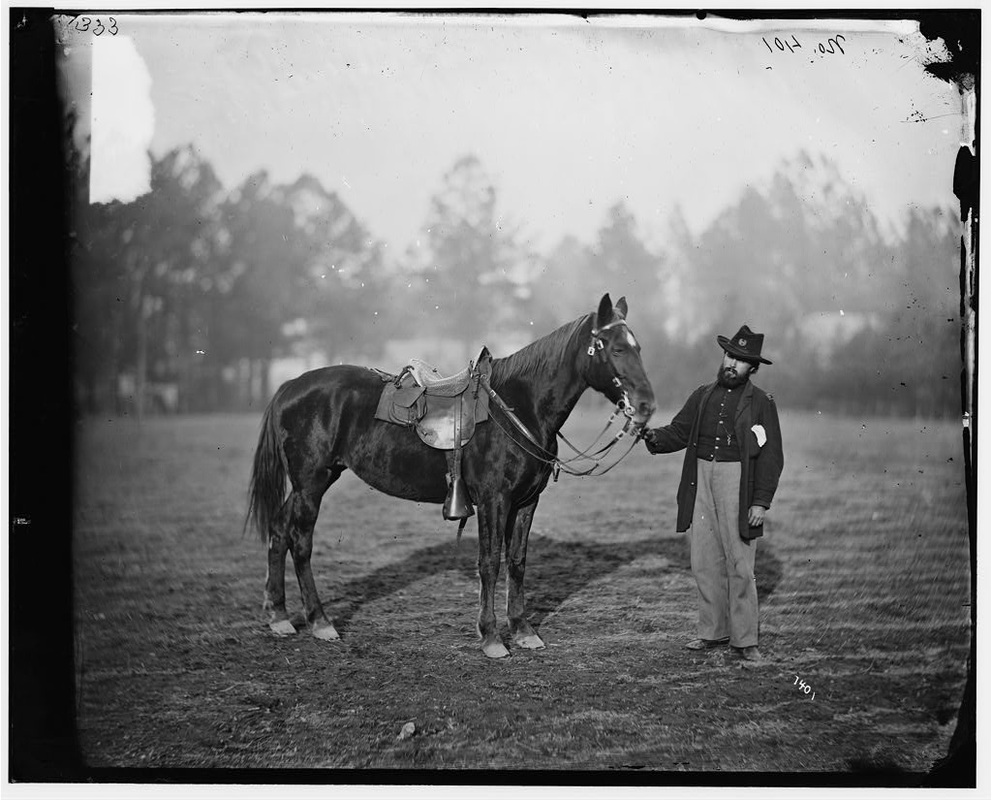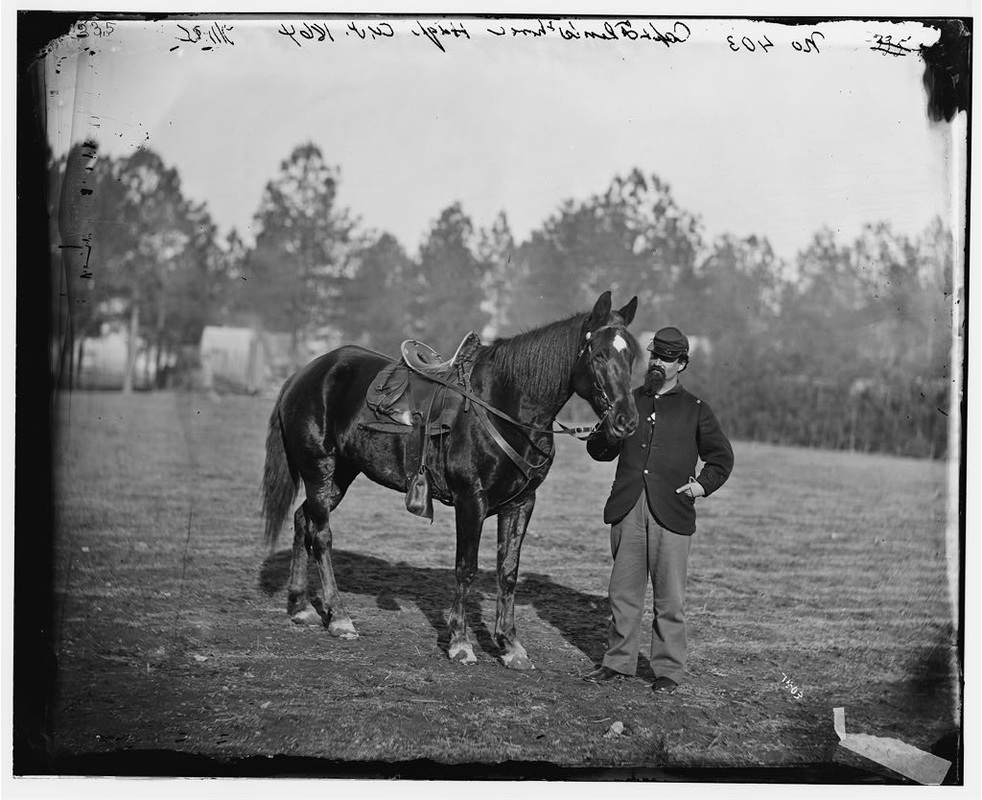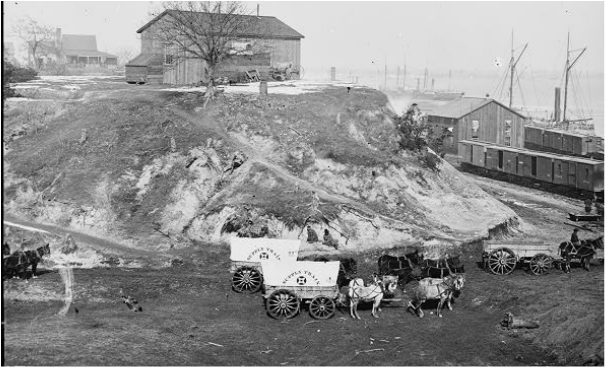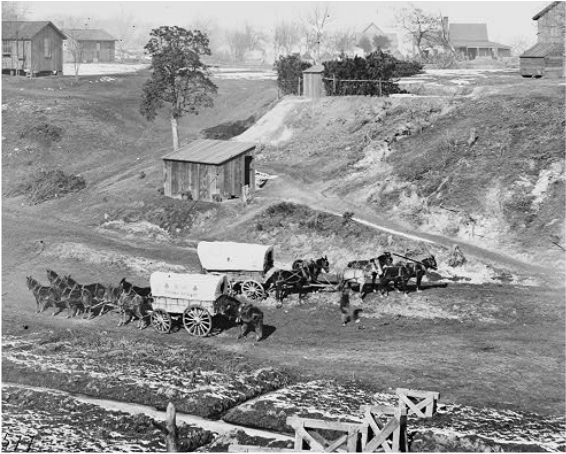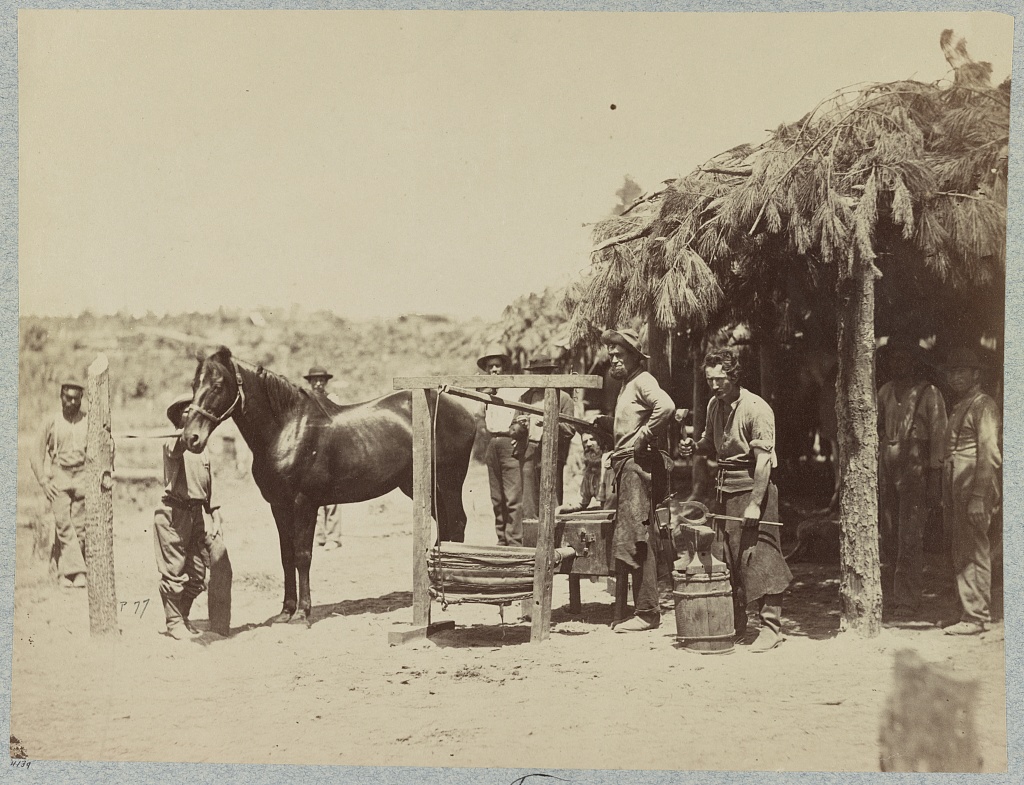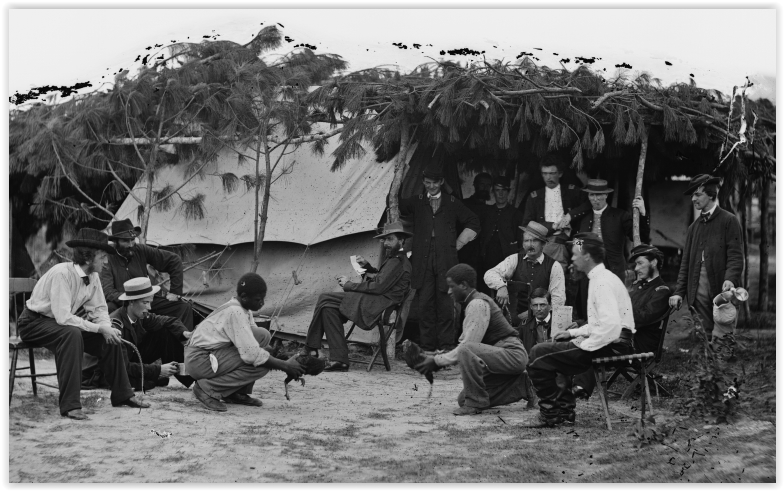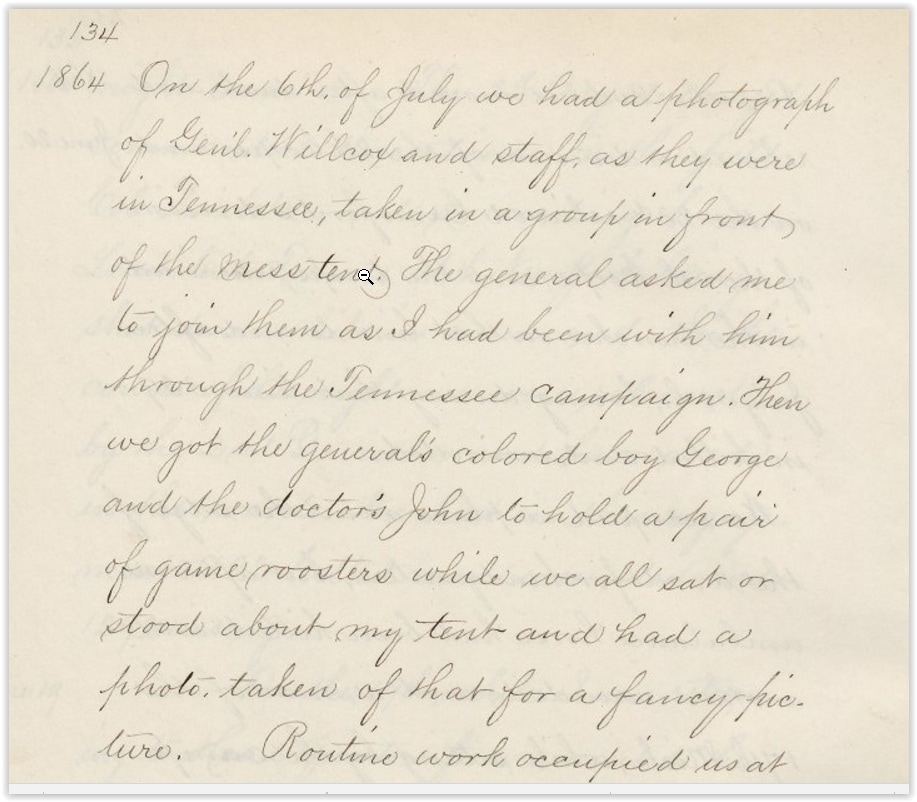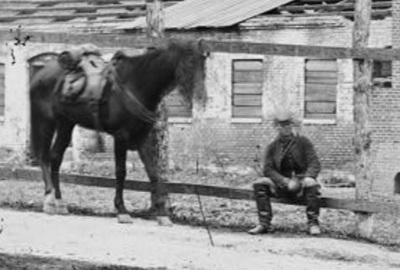"The Cat Will Mew, the Dog Will Have His Day."
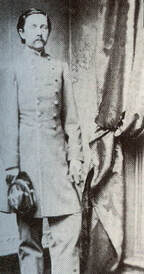
A CAT BREAKS THE TENSION
I have before stated that my camp was back of old Blandford church, dug into the slope of the hill. From the camp to the church was an open, closely grazed field called the "common," sloping down towards the camp, and a favorite resort for cats from town at night. My fly was pitched in a dugout about ten feet wide dug back into the hill to a perpendicular wall about eight feet high. The back pole of the fly set against this perpendicular bank and reached three or four feet above the surface, so that there was an opening in the gable of the fly from the surface of the ground behind to the ridge pole, left in this way for light and air during the hot weather. One night a working party was to be sent out to start a mine in an exposed place and the officers who were to go with it, four or five in number, were sitting around a table in my tent, examining a plan of the work I had made and was explaining to them. We were all intently engaged on this when we heard approaching through the still night air what sounded like a railroad express train. We all knew what it was. It was the long-expected three-hundred-pounder; but no one spoke, all pretending unawareness, and I went on with my explanation. It must have been three miles off when it started and by a computation I made it must have reached an elevation of at least five thousand feet. It seemed hours that we were kept in suspense, though I suppose it was not really more than two or three minutes. Presently the sound came from right over our heads, apparently, and increased to a terrific roar, becoming louder and louder every second and I was sure it was going to fall right on my table. In spite of all I could do I felt my hand on the plan in which I held my pencil begin to shake; so I had to stick the end of the pencil into the paper to keep it steady, and I found my explanations were becoming not as lucid as they might have been, nor my voice as steady as usual. Just then a young Lieutenant sitting at the end of the table, a young fellow of not over eighteen or twenty, got so nervous that he slipped under the table; this started a titter among the others, which an instant later burst into an irrepressible roar of laughter from a most unexpected event.
I have before stated that my camp was back of old Blandford church, dug into the slope of the hill. From the camp to the church was an open, closely grazed field called the "common," sloping down towards the camp, and a favorite resort for cats from town at night. My fly was pitched in a dugout about ten feet wide dug back into the hill to a perpendicular wall about eight feet high. The back pole of the fly set against this perpendicular bank and reached three or four feet above the surface, so that there was an opening in the gable of the fly from the surface of the ground behind to the ridge pole, left in this way for light and air during the hot weather. One night a working party was to be sent out to start a mine in an exposed place and the officers who were to go with it, four or five in number, were sitting around a table in my tent, examining a plan of the work I had made and was explaining to them. We were all intently engaged on this when we heard approaching through the still night air what sounded like a railroad express train. We all knew what it was. It was the long-expected three-hundred-pounder; but no one spoke, all pretending unawareness, and I went on with my explanation. It must have been three miles off when it started and by a computation I made it must have reached an elevation of at least five thousand feet. It seemed hours that we were kept in suspense, though I suppose it was not really more than two or three minutes. Presently the sound came from right over our heads, apparently, and increased to a terrific roar, becoming louder and louder every second and I was sure it was going to fall right on my table. In spite of all I could do I felt my hand on the plan in which I held my pencil begin to shake; so I had to stick the end of the pencil into the paper to keep it steady, and I found my explanations were becoming not as lucid as they might have been, nor my voice as steady as usual. Just then a young Lieutenant sitting at the end of the table, a young fellow of not over eighteen or twenty, got so nervous that he slipped under the table; this started a titter among the others, which an instant later burst into an irrepressible roar of laughter from a most unexpected event.
As I have said, the common above the fly was a resort for cats from the town at night, and these cats, hearing the fearful
noise above them, and seeing the long stream of fire shooting towards them from the heavens, became completely
demoralized and went scampering by as fast as they could run, back to the deserted houses where they made their homes. One huge tomcat, however, came tearing down the hill with eyes flaming, claws out, and hair on end, directly towards my fly. He was going so fast that he could not avoid the pit in which the fly stood, but came dashing, spitting and sputtering with one bound flop on the table, and with another clear out at the front and away.
The effect was irresistible. If we were all to go to kingdom come the next instant, laugh we must, and laugh we did until
the tears ran down our cheeks (pp. 272-274).
War Years with JEB Stuart. W.W. Blackford. Scribner and Sons, N.Y., 1940.
noise above them, and seeing the long stream of fire shooting towards them from the heavens, became completely
demoralized and went scampering by as fast as they could run, back to the deserted houses where they made their homes. One huge tomcat, however, came tearing down the hill with eyes flaming, claws out, and hair on end, directly towards my fly. He was going so fast that he could not avoid the pit in which the fly stood, but came dashing, spitting and sputtering with one bound flop on the table, and with another clear out at the front and away.
The effect was irresistible. If we were all to go to kingdom come the next instant, laugh we must, and laugh we did until
the tears ran down our cheeks (pp. 272-274).
War Years with JEB Stuart. W.W. Blackford. Scribner and Sons, N.Y., 1940.
Cats and Kittens at City Point
|
Horace Porter recalled President Lincoln playing with kittens at City Point, saying that it was a “curious sight at an army headquarters, upon the eve of a great military crisis” to watch the commander-in-chief “tenderly caressing three stray kittens. It well illustrated the kindness of the man’s disposition, and showed the childlike simplicity which was mingled with the grandeur of his nature.” -- Porter, Campaigning with Grant, 410
At the Avery House June 30, [1864] At the present time we are doing nothing here [with the 5th Corps at the Avery house], either to finish the war or fill my journal....Books we have none, so time hangs heavy; as one might judge when I took to playing chess, a game about which I know nothing and which I have never liked.... Another amusement is playing with a litter of kittens which have been dropped since we came here. Charles Wainwright, A Diary of Battle. |
"Cry Havoc! and Let Slip the Dogs of War."
General Willcox, Kearney, and Gyp
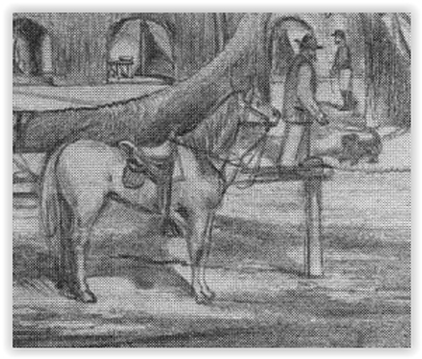 General Orlando Willcox with his horse Kearney and his puppy Gyp at the Friend house. Detail from drawing by Andrew McCallum.
General Orlando Willcox with his horse Kearney and his puppy Gyp at the Friend house. Detail from drawing by Andrew McCallum.
"Then Elon has a new dog? I wonder if he is as funny as Gyp? Gyp is already getting watchful at night. He sits on his hind legs, runs after a chipmunk & cracks chestnuts like a squirrel."
"Gyp remains as funny & bright as ever. If the officers don't spoil him by playing with him, I think he will be a nice little fellow worth taking home. He is a perfect little beauty with long and silken black hair like feathers on his head & and his tail like a plume. At night he takes his place at the foot of the bed & keeps my feet warm after the fire in the tent dies down."
"It was a beautiful sunshiny morning & the troops & even the horses feel in fine spirits. My horse Kearney was full of life, but under perfect management with one hand."
-- General Orlando Willcox, from Forgotten Valor, Scott, ed.
"Gyp remains as funny & bright as ever. If the officers don't spoil him by playing with him, I think he will be a nice little fellow worth taking home. He is a perfect little beauty with long and silken black hair like feathers on his head & and his tail like a plume. At night he takes his place at the foot of the bed & keeps my feet warm after the fire in the tent dies down."
"It was a beautiful sunshiny morning & the troops & even the horses feel in fine spirits. My horse Kearney was full of life, but under perfect management with one hand."
-- General Orlando Willcox, from Forgotten Valor, Scott, ed.
Quartermaster General Rufus Ingalls and his Dog at City Point
|
|
"General Ingalls had just returned from a trip to Washington, and brought with him an English spotted coachdog, which followed him everywhere through camp, and attracted no end of attention. A dog of any kind was rather an unusual sight in an army in the field, and an animal of the peculiar marks and aristocratic bearing of Ingalls's companion excited wide-spread remark. Every time the dog came to headquarters, General Grant was certain to comment upon the animal, and perpetrate some good-natured joke at the expense of his classmate. The dog followed the usual canine custom, and expressed his feelings by an agitation of his caudal appendage. To describe his actions astronomically, it may be said that he indicated anger by imparting to his tail a series of longitudinal vibrations, and pleasure by giving it a gentle "motion in azimuth" — familiarly known as a wag. One evening, as the general was sitting in front of his quarters, Ingalls came up to have a chat with him, and was followed by the dog, which sat down in the usual place at its master's feet. The animal squatted upon its hind quarters, licked its chops, pricked up its ears, and looked first at one officer and then at the other, as if to say: "I am General Ingalls's dog; whose pup are you?" In the course of his remarks General Grant took a look at the animal, and said: "Well, Ingalls, what are your real intentions in regard to that dog? Do you expect to take it into Richmond with you?" Ingalls, who was noted for his dry humor, replied with mock seriousness and an air of extreme patience: "I hope to; it is said to come from a long-lived breed." This retort, coupled with the comical attitude of the dog at the time, turned the laugh upon the general, who joined heartily in the merriment, and seemed to enjoy the joke as much as any of the party." -- Horace Porter, Campaigning with Grant, 330-331
Some Doggie Anecdotes
Chasing Bullets
While the Reg. was here by the river [the Appomattox], a ' liver and white ' pointer dog used occasionally to get between the Union and Confederate lines in Mr. John Hare's field, and mistaking the flying bullets for bees, would run
hither and thither, giving up the chase of one when he heard the hum of another, tacking and darting after them every which way for an hour at a time — a clear case of ignorance proving to be bliss (p. 414).
-- 13th New Hampshire Regiment. Millett Thompson.
Dog Express
The dog express will ever be memorable in this winter's annals, since a certain canine of strictly impartial sentiments had been taught to respond to a whistle from either side. Thus with a can of coffee suspended from his neck he would amble over to the Johnnies, and when they had replaced coffee with tobacco he would return in obedience to Union signals, intent only on the food reward both sides gave him.
The Ninth New York Heavy Artillery: A History of Its Organization.... Alfred Seelye Roe, 1899.
Battlefield Burial
During the battle {February 7, 1865] Lieutenant Colonel Edwards noticed that his men had ceased firing in one place They were helping the Seventh Wisconsin men bury their pet dog which had followed them from camp to field and was always sharing his chances in battle with the men knowing no fear This day a minnie ball killed him and the men suspended their shooting long enough to give their pet dog an honorable but hasty burial amid showers of bullets from the enemy (p. 292).
-- A History of the Twenty-Fourth Michigan,Known as the Iron Brigade, Orson Blair Curtis. 1891.
Hunting Deserters
There is a Captain Young who is famous as a Rebel Scout and always goes attended by a large white dog, who is a terror to their men. He spends his nights between the lines, and has caught many of their attempted deserters. He spends his time spying out our lines, and General Meade, it is said, has offered a large reward for his capture. Last night the dog, who is his precursor, was seen by two of our pickets. I immediately took five of our men and set out in pursuit. We prowled around between the lines an hour or so, and not meeting him or finding any trace, we had to give it up as a bad job (pp 321-322).
--Recollections of the Civil War; with many original diary entries and letters written from the seat of war, and with annotated references. by Mason Whiting Tyler and William Seymour Tyler, 1912.
Dr. Claiborne and Jack retreat from Petersburg in April 1865
…on the heights of Ettrick took one last look at Petersburg- as it was. Here I overtook my cortege. And, mustering them, found one absentee. This was a yellow, bob-tailed, bob-eared, rough haired Scotch terrier, about twelve years old, who had seen no little service and showed it. He was irritable, selfish, self-asserting, frail as to virtue, his name disagreeably associated with any number of scandals, but full of faith in his master, and irrevocably attached to his master’s fortunes, or misfortunes. I had given my chief of ambulance orders that, whoever should be left behind, Jack should go, and proper transportation should be furnished him. He had always had too high an appreciation of himself to walk, and had ridden more thousands of miles, had fallen out of more vehicles, and been run over oftener, than any other dog in the world. I assert this without fear of contradiction.
He had but few friends, and but little capacity to make friends. Some incompatibility of temper, I suspect, had occurred betwixt him and the chief of ambulance, on the subject of riding, before the start from Petersburg, and hence Jack was left behind. I said to the chief: ”Return at once to the city and find me my dog, or fall into the hands of the enemy with him.” The man looked at me for a minute as if he would question such an order, but four years of discipline and obedience had not lost its force on the first night of the retreat, and he turned off and retraced his steps to Petersburg. I never expected to see him again, but late at night and after we had gone into camp, he returned on horseback… and was leading Jack by a chain of white handkerchiefs. I did not inquire where he got the horse, but having some curiousity as to where he got the handkerchiefs, I ventured to ask him. “Well, Sir,” he said, “they are breaking up everything in town and robbing the stores, and I found these handkerchiefs at the head of Old street.”…. One tremendous explosion caused such panic in our little party that Jack, who had slept on my blanket at my side, became demoralized and sought individual safety in individual flight. As he disappeared in the darkness I never expected to see him again, and never did until after my return, some two months later, to Petersburg, when he was the first one of my acquaintances to meet and greet me. His subsequent history, though not without interest or detail, would lead me away from my subject, and henceforth he will appear in this narrative no more. He was a poor soldier, always left the line when the firing began, impelled by thirst or some other consideration of a personal character; but his services in civil life entitled him, in my belief, to the right of civil sepulture, and you will find his grave in the section marked “Claiborne”, in the old Blandford Cemetery, and his epitaph in the 3rd chapter of Ecclesiastes, 20th and 21st verses (pp 241-242). [The author visited the Claiborne plot in Blandford cemetery and located the good doctor's grave, but did not find a stone engraved "Jack" or the beautiful epitaph cited below. Perhaps one of the unmarked foot stones commemorates this "poor soldier"-but-beloved companion.]
Dr. John Herbert Claiborne, War Talks of Confederate Veterans, compiled by George S. Bernard, 1892
Ecclesiastes, Chapter 3:
20 All go to the same place; all come from dust, and to dust all return. 21 Who knows if the human spirit rises upward and if the spirit of the animal goes down into the earth?”
Battle of the Crater
...We gather in a little band of thirty or forty around our colonel. What is next to be done? Over yonder near the old barn they are getting a new battery into position to enfilade us. It is a part of Lee's forces that have just got back from the right. Comrades Billy Gates, Bob Hamilton, and myself, form ourselves into sharp-shooters, and try to pick off the gunners. Bob's little yellow dog has come into the fight with him, and is jumping around, yelling and barking, as if fully alive to the importance of the situation. Suddenly a yip and a yell tells us the dog is hit. Bob drops his rifle, grabs and hurriedly examines the dog. A ball has skipped across his back and burnt off the hair, that is all (pp. 288-289).
Forty-six months with the Fourth R. I. volunteers, in the war of 1861 to 1865 Corp. Geo. H. Allen, of Company B. 1887.
While the Reg. was here by the river [the Appomattox], a ' liver and white ' pointer dog used occasionally to get between the Union and Confederate lines in Mr. John Hare's field, and mistaking the flying bullets for bees, would run
hither and thither, giving up the chase of one when he heard the hum of another, tacking and darting after them every which way for an hour at a time — a clear case of ignorance proving to be bliss (p. 414).
-- 13th New Hampshire Regiment. Millett Thompson.
Dog Express
The dog express will ever be memorable in this winter's annals, since a certain canine of strictly impartial sentiments had been taught to respond to a whistle from either side. Thus with a can of coffee suspended from his neck he would amble over to the Johnnies, and when they had replaced coffee with tobacco he would return in obedience to Union signals, intent only on the food reward both sides gave him.
The Ninth New York Heavy Artillery: A History of Its Organization.... Alfred Seelye Roe, 1899.
Battlefield Burial
During the battle {February 7, 1865] Lieutenant Colonel Edwards noticed that his men had ceased firing in one place They were helping the Seventh Wisconsin men bury their pet dog which had followed them from camp to field and was always sharing his chances in battle with the men knowing no fear This day a minnie ball killed him and the men suspended their shooting long enough to give their pet dog an honorable but hasty burial amid showers of bullets from the enemy (p. 292).
-- A History of the Twenty-Fourth Michigan,Known as the Iron Brigade, Orson Blair Curtis. 1891.
Hunting Deserters
There is a Captain Young who is famous as a Rebel Scout and always goes attended by a large white dog, who is a terror to their men. He spends his nights between the lines, and has caught many of their attempted deserters. He spends his time spying out our lines, and General Meade, it is said, has offered a large reward for his capture. Last night the dog, who is his precursor, was seen by two of our pickets. I immediately took five of our men and set out in pursuit. We prowled around between the lines an hour or so, and not meeting him or finding any trace, we had to give it up as a bad job (pp 321-322).
--Recollections of the Civil War; with many original diary entries and letters written from the seat of war, and with annotated references. by Mason Whiting Tyler and William Seymour Tyler, 1912.
Dr. Claiborne and Jack retreat from Petersburg in April 1865
…on the heights of Ettrick took one last look at Petersburg- as it was. Here I overtook my cortege. And, mustering them, found one absentee. This was a yellow, bob-tailed, bob-eared, rough haired Scotch terrier, about twelve years old, who had seen no little service and showed it. He was irritable, selfish, self-asserting, frail as to virtue, his name disagreeably associated with any number of scandals, but full of faith in his master, and irrevocably attached to his master’s fortunes, or misfortunes. I had given my chief of ambulance orders that, whoever should be left behind, Jack should go, and proper transportation should be furnished him. He had always had too high an appreciation of himself to walk, and had ridden more thousands of miles, had fallen out of more vehicles, and been run over oftener, than any other dog in the world. I assert this without fear of contradiction.
He had but few friends, and but little capacity to make friends. Some incompatibility of temper, I suspect, had occurred betwixt him and the chief of ambulance, on the subject of riding, before the start from Petersburg, and hence Jack was left behind. I said to the chief: ”Return at once to the city and find me my dog, or fall into the hands of the enemy with him.” The man looked at me for a minute as if he would question such an order, but four years of discipline and obedience had not lost its force on the first night of the retreat, and he turned off and retraced his steps to Petersburg. I never expected to see him again, but late at night and after we had gone into camp, he returned on horseback… and was leading Jack by a chain of white handkerchiefs. I did not inquire where he got the horse, but having some curiousity as to where he got the handkerchiefs, I ventured to ask him. “Well, Sir,” he said, “they are breaking up everything in town and robbing the stores, and I found these handkerchiefs at the head of Old street.”…. One tremendous explosion caused such panic in our little party that Jack, who had slept on my blanket at my side, became demoralized and sought individual safety in individual flight. As he disappeared in the darkness I never expected to see him again, and never did until after my return, some two months later, to Petersburg, when he was the first one of my acquaintances to meet and greet me. His subsequent history, though not without interest or detail, would lead me away from my subject, and henceforth he will appear in this narrative no more. He was a poor soldier, always left the line when the firing began, impelled by thirst or some other consideration of a personal character; but his services in civil life entitled him, in my belief, to the right of civil sepulture, and you will find his grave in the section marked “Claiborne”, in the old Blandford Cemetery, and his epitaph in the 3rd chapter of Ecclesiastes, 20th and 21st verses (pp 241-242). [The author visited the Claiborne plot in Blandford cemetery and located the good doctor's grave, but did not find a stone engraved "Jack" or the beautiful epitaph cited below. Perhaps one of the unmarked foot stones commemorates this "poor soldier"-but-beloved companion.]
Dr. John Herbert Claiborne, War Talks of Confederate Veterans, compiled by George S. Bernard, 1892
Ecclesiastes, Chapter 3:
20 All go to the same place; all come from dust, and to dust all return. 21 Who knows if the human spirit rises upward and if the spirit of the animal goes down into the earth?”
Battle of the Crater
...We gather in a little band of thirty or forty around our colonel. What is next to be done? Over yonder near the old barn they are getting a new battery into position to enfilade us. It is a part of Lee's forces that have just got back from the right. Comrades Billy Gates, Bob Hamilton, and myself, form ourselves into sharp-shooters, and try to pick off the gunners. Bob's little yellow dog has come into the fight with him, and is jumping around, yelling and barking, as if fully alive to the importance of the situation. Suddenly a yip and a yell tells us the dog is hit. Bob drops his rifle, grabs and hurriedly examines the dog. A ball has skipped across his back and burnt off the hair, that is all (pp. 288-289).
Forty-six months with the Fourth R. I. volunteers, in the war of 1861 to 1865 Corp. Geo. H. Allen, of Company B. 1887.
Did the pup stand up for Lincoln?
"A Horse, A Horse, My Kingdom for a Horse!"
Proud Horses, Grooms, and Officers at Petersburg

"As we sat there an unexploded spherical case came near taking off the hind legs of Grant’s 4000-dollar horse." -- Theodore Lyman, near Hatcher's Run, October 27, 1864.
Horse Racing -- Not always Approved Of
October 14th....A horse race track had been improvised near Fort Dushane, which many of the Generals, other officers and men visited on race days.... On the 19th, Lieutenant-Colonel Edwards called General Crawford's attention to the horse racing ... as having a demoralizing effect upon the army....On Saturday, the 22d, General Warren sent down and arrested all the enlisted men at the horse races. Several Generals and numerous other officers were present (PP276-277). -- History of the Twenty-Fourth Michigan, Curtis 1891.
March 17, Friday
St. Patrick, hys [sic] day, in whose honor the Irish brigade of the 2nd Corps gave races, near the Cummings house. There was a stand, gay with flags; and a band which discoursed sweet music from an army wagon. A large number of soldiers were allowed to be present and behaved most correctly. On the stand were Gens. Humphreys, Mott, Hayes, Warren, Crawford, Ayres Miles &c. & Gen. Meade was also there, and a parcel of ladies…. (pp. 345-346).
Meade’s Army: The Private Notebooks of Lt. Col. Theodore Lyman. Edited by David Lowe. Kent State University Press, 2007.
March 17, Friday
St. Patrick, hys [sic] day, in whose honor the Irish brigade of the 2nd Corps gave races, near the Cummings house. There was a stand, gay with flags; and a band which discoursed sweet music from an army wagon. A large number of soldiers were allowed to be present and behaved most correctly. On the stand were Gens. Humphreys, Mott, Hayes, Warren, Crawford, Ayres Miles &c. & Gen. Meade was also there, and a parcel of ladies…. (pp. 345-346).
Meade’s Army: The Private Notebooks of Lt. Col. Theodore Lyman. Edited by David Lowe. Kent State University Press, 2007.
Barlow is a Softie
"A Confederate colonel was captured during the fight [Jerusalem Plank Road]. He was mounted on a superb gray horse which General Barlow afterwards purchased and rode in battle. The splendid animal became very fond of the General and would follow him around the camp begging for the lumps of sugar that the General would be pretty sure to have in his pocket with which to treat his equine friend".
St. Clair A. Mulholland, The Story of the 116th Regiment, Pennsylvania Volunteers, p.278. Winslow Homer, Special Artist
Miranda Tries to Desert
My duties kept me on the picket line most of the time. On one occasion I was lying down drawing in a notebook, the vedette looking on, when suddenly he cried “Your horse is gone!” There, walking across the open field, straight towards the Yankees was Miranda. I ordered the man to bring her back as he should have been holding her. Off he dashed and within probably not fifty yards of the Yankee Vedette, he caught her and brought her back. I rather expected the Yank would fire on him, but he did not….I was ashamed of my old warhorse for trying to desert to the enemy. I think she hoped to get full rations on the other side, for about this time both men and horses were slowly starving on the Confederate side (pp 98-99).
In the Saddle With Jeb Stuart: the Story of Frank Robertson Smith of Jeb Stuarts’s Staff, edited by Robert J. Trout.
The Chaplain's horse, Jack
... the Chaplain during the last months of the service, had a third horse, Jack.... He was an undersized, club-footed, long-haired, sorrel colt, and many a sly remark was made to the Chaplain about his new mount. Jack joined the Regiment in this way. In the fall of 1864 [at Petersburg] a twelve-year-old bare footed girl came into the camp, selling cakes and pies. Questioned by the Chaplain, she stated that her home was near. After several visits to his quarters he accompanied her to her home and found it to be a very humble log cabin, occupied by the father, mother and several children. They were soundly loyal and greatly desired to get farther north, where their surroundings would be more congenial and where the father believed he could better care for his family and his children could obtain an education through the free public schools. Twenty-five dollars would pay their car fare, but they were very poor, had no money and nothing to sell, save Jack, who at that time was hardly worth five dollars. The Chaplain purchased him paying the amount needed for transportation, from the double motive of aiding the family and experimenting on Jack's feet.
In due time Jack was led into camp, the observed of all observers. Dismay struck the heart of every horse owner in the Regiment, if not in the Division, when it was speedily noised abroad the Chaplain's new horse was not only ugly and worthless but lousy — myriads of them — the shaggy jacket full of them. Consternation rapidly gave place to indignation; angry protests were uttered. The Chaplain calmly replied that the charges against Jack were true but that he would be responsible for him and his numerous colony. The troops were receiving rations of potatoes; he went among the boys and begged the peelings, boiled them thoroughly, washed Jack in the water and ever afterward he was as clean as any other equine.
When the Regiment broke camp in the spring of 1865, Jack was turned loose to shift for himself. When the Regiment marched out of sight he was contentedly munching at a pile of several bushels of oats, heaped on the ground. But he was not loyal to his former master and had been too long with the Regiment to be forsaken in that way and did not propose to remain alone in rebeldom, even if unlimited freedom was the proffered bribe. The next day as the Chaplain rode in the marching column, Jack gaily trotted up to him. After trying to drive him away and failing, he told the boys to get a rope, put a halter on him and load him with their pans, kettles and knapsacks. Thus he participated in the pursuit of Lee and the long return march to Washington, was then sent to Meadow Gap, Huntingdon County, and became the property of a Dutchman, proportionately diminutive as he was. His new owner never having possessed a horse did not understand all the complicated mechanism of a horse's anatomy and a few days after the sale came to the Chaplain in great anxiety asking him to take Jack back, that there was something wrong with him. ''There is nothing wrong except his feet and you knew that before you bought him." The Dutchman replied, "There is something wrong with his insides, when he runs downhill they go gooly, gooly, gooly." He was persuaded to give Jack a further trial and became so enamored of him that to his dying day he was rapturous in his praise of the good qualities of "mine Shack." The facts were, Jack's feet became nearly straight, his shaggy coat short and lustrous and he developed into considerable of a horse.
The Story of Our Regiment, A History of the 148th Pennsylvania Vols., Written by the Comrades, ADJT. J. W. MUFFLY, ed., 1904, pp 210-212.
In due time Jack was led into camp, the observed of all observers. Dismay struck the heart of every horse owner in the Regiment, if not in the Division, when it was speedily noised abroad the Chaplain's new horse was not only ugly and worthless but lousy — myriads of them — the shaggy jacket full of them. Consternation rapidly gave place to indignation; angry protests were uttered. The Chaplain calmly replied that the charges against Jack were true but that he would be responsible for him and his numerous colony. The troops were receiving rations of potatoes; he went among the boys and begged the peelings, boiled them thoroughly, washed Jack in the water and ever afterward he was as clean as any other equine.
When the Regiment broke camp in the spring of 1865, Jack was turned loose to shift for himself. When the Regiment marched out of sight he was contentedly munching at a pile of several bushels of oats, heaped on the ground. But he was not loyal to his former master and had been too long with the Regiment to be forsaken in that way and did not propose to remain alone in rebeldom, even if unlimited freedom was the proffered bribe. The next day as the Chaplain rode in the marching column, Jack gaily trotted up to him. After trying to drive him away and failing, he told the boys to get a rope, put a halter on him and load him with their pans, kettles and knapsacks. Thus he participated in the pursuit of Lee and the long return march to Washington, was then sent to Meadow Gap, Huntingdon County, and became the property of a Dutchman, proportionately diminutive as he was. His new owner never having possessed a horse did not understand all the complicated mechanism of a horse's anatomy and a few days after the sale came to the Chaplain in great anxiety asking him to take Jack back, that there was something wrong with him. ''There is nothing wrong except his feet and you knew that before you bought him." The Dutchman replied, "There is something wrong with his insides, when he runs downhill they go gooly, gooly, gooly." He was persuaded to give Jack a further trial and became so enamored of him that to his dying day he was rapturous in his praise of the good qualities of "mine Shack." The facts were, Jack's feet became nearly straight, his shaggy coat short and lustrous and he developed into considerable of a horse.
The Story of Our Regiment, A History of the 148th Pennsylvania Vols., Written by the Comrades, ADJT. J. W. MUFFLY, ed., 1904, pp 210-212.
Salute to Working Horses and Mules
Odds and Ends, including Farriers and a Couple of Roosters
Biological Warfare
One day Abels saw an old horse coming toward the bomb-proof, and he very energetically called to the boys who were standing near the animal, "don't let that old horse come up here, drive him away; drive him off or he'll get shot and we will have to drag him away to-night and bury him." No one stopped the horse, and as he came in front of the bombproof the Johnnies fired hundreds of shots at him, but he kept on feeding and nibbling the grass, taking no notice of the bullets that were being fairly showered on him. At last one bullet struck a vital part and the poor old horse fell right in front of the bomb-proof. "There, I gaddy! I told yon so," Abels exclaimed, " we will have to drag that old horse off and bury him to-night." p569.
History of the First Light Battery Connecticut Volunteers, 1861-1865. Personal records and reminiscences. The story of the battery from its organization to the present time, by Beecher, Herbert W; De Morgan, John, ed
History of the First Light Battery Connecticut Volunteers, 1861-1865. Personal records and reminiscences. The story of the battery from its organization to the present time, by Beecher, Herbert W; De Morgan, John, ed

